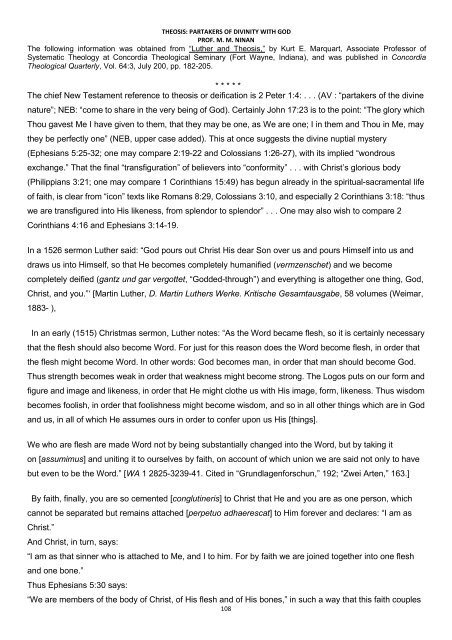Theosis
You also want an ePaper? Increase the reach of your titles
YUMPU automatically turns print PDFs into web optimized ePapers that Google loves.
THEOSIS: PARTAKERS OF DIVINITY WITH GOD<br />
PROF. M. M. NINAN<br />
The following information was obtained from “Luther and <strong>Theosis</strong>,” by Kurt E. Marquart, Associate Professor of<br />
Systematic Theology at Concordia Theological Seminary (Fort Wayne, Indiana), and was published in Concordia<br />
Theological Quarterly, Vol. 64:3, July 200, pp. 182-205.<br />
* * * * *<br />
The chief New Testament reference to theosis or deification is 2 Peter 1:4: . . . (AV : “partakers of the divine<br />
nature”; NEB: “come to share in the very being of God). Certainly John 17:23 is to the point: “The glory which<br />
Thou gavest Me I have given to them, that they may be one, as We are one; I in them and Thou in Me, may<br />
they be perfectly one” (NEB, upper case added). This at once suggests the divine nuptial mystery<br />
(Ephesians 5:25-32; one may compare 2:19-22 and Colossians 1:26-27), with its implied “wondrous<br />
exchange.” That the final “transfiguration” of believers into “conformity” . . . with Christ’s glorious body<br />
(Philippians 3:21; one may compare 1 Corinthians 15:49) has begun already in the spiritual-sacramental life<br />
of faith, is clear from “icon” texts like Romans 8:29, Colossians 3:10, and especially 2 Corinthians 3:18: “thus<br />
we are transfigured into His likeness, from splendor to splendor” . . . One may also wish to compare 2<br />
Corinthians 4:16 and Ephesians 3:14-19.<br />
In a 1526 sermon Luther said: “God pours out Christ His dear Son over us and pours Himself into us and<br />
draws us into Himself, so that He becomes completely humanified (vermzenschet) and we become<br />
completely deified (gantz und gar vergottet, “Godded-through”) and everything is altogether one thing, God,<br />
Christ, and you.”‘ [Martin Luther, D. Martin Luthers Werke. Kritische Gesamtausgabe, 58 volumes (Weimar,<br />
1883- ),<br />
In an early (1515) Christmas sermon, Luther notes: “As the Word became flesh, so it is certainly necessary<br />
that the flesh should also become Word. For just for this reason does the Word become flesh, in order that<br />
the flesh might become Word. In other words: God becomes man, in order that man should become God.<br />
Thus strength becomes weak in order that weakness might become strong. The Logos puts on our form and<br />
figure and image and likeness, in order that He might clothe us with His image, form, likeness. Thus wisdom<br />
becomes foolish, in order that foolishness might become wisdom, and so in all other things which are in God<br />
and us, in all of which He assumes ours in order to confer upon us His [things].<br />
We who are flesh are made Word not by being substantially changed into the Word, but by taking it<br />
on [assumimus] and uniting it to ourselves by faith, on account of which union we are said not only to have<br />
but even to be the Word.” [WA 1 2825-3239-41. Cited in “Grundlagenforschun,” 192; “Zwei Arten,” 163.]<br />
By faith, finally, you are so cemented [conglutineris] to Christ that He and you are as one person, which<br />
cannot be separated but remains attached [perpetuo adhaerescat] to Him forever and declares: “I am as<br />
Christ.”<br />
And Christ, in turn, says:<br />
“I am as that sinner who is attached to Me, and I to him. For by faith we are joined together into one flesh<br />
and one bone.”<br />
Thus Ephesians 5:30 says:<br />
“We are members of the body of Christ, of His flesh and of His bones,” in such a way that this faith couples<br />
108

















